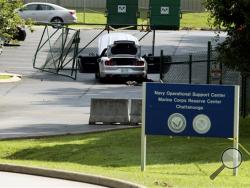CHATTANOOGA, Tenn. (AP) — Twenty Marines and two Navy corpsmen were in the middle of an otherwise mundane task, just checking their equipment after a training mission, when the silver Mustang convertible came barreling through the gates of the reserve center on the banks of the Tennessee River.
The driver blasted his way through that facility for the next three to five minutes, officials said during a Wednesday news conference that provided the most complete account yet of how four Marines and a sailor were killed. The shooter's motives remain unclear to investigators, even nearly a week later.
Muhammad Abdulazeez made his first stop at a military recruiting office about 7 miles away, sending recruiters there scrambling for cover from the hail of gunfire that left the front windows pocked with bullet holes. Abdulazeez never left the driver's seat, staying only briefly before moving to his next target.
After plowing his rented car through the gates, and with Chattanooga Police chasing close behind, the gunman got out of the car and stormed into the building. He was ready for a shootout: Abdulazeez wore a vest with extra ammunition. One gun was found in his vehicle; an assault rifle and a handgun were found on him.
A service member inside the building saw Abdulazeez approaching and fired at him. The gunman shot back and then proceeded inside.
Once inside, he fatally wounded Petty Officer 2nd Class Randall Smith and "continued to shoot those he encountered," FBI Knoxville Special Agent in Charge Ed Reinhold said at a news conference.
As police followed the gunshots, he then walked out the back door into a gated motor pool area, where troops tried to scramble over a fence to safety. It was there that the remaining four were killed: Staff Sgt. David Wyatt, Sgt. Carson Holmquist, Gunnery Sgt. Thomas Sullivan and Lance Cpl. Squire Wells.
When the shooting first started, troops inside the building went room to room to rush their colleagues to safety, said Maj. Gen. Paul W. Brier, commanding general of the 4th Marine Division. Then, some rushed back into the fight.
Two guns belonging to service members were recovered at the scene, he said; shots were fired from at least one. It's unclear if the gunman was hit by one of those weapons, Reinhold said. The military will investigate whether the service members were authorized to have those weapons.
In the motor pool area, two Marines tried to "provide cover" while their comrades tried to escape over the fence, Reinhold said.
Both Reinhold and Brier declined to elaborate further on how the troops engaged Abdulazeez.
"I can tell you that our Marines reacted the way you would expect," Brier said.
At one point, Abdulazeez tried to run back into the building. When he did, Chattanooga officers confronted him. A shootout erupted. One police officer was wounded; Abdulazeez was killed.
When asked about the possibility of friendly fire, Reinhold said it appears that all of the victims were killed by the same weapon.
Friends and neighbors recalled a happy, polite young man. But a picture has emerged showing Abdulazeez was troubled in his last days: He abused drugs and alcohol, stared down the possibility of bankruptcy and couldn't find a job. He failed a drug test in 2013, getting him fired from a job at a power plant, which prompted personal writings soon after lamenting what a failure he had been, according to his family.
An uncle in Jordan who agreed to host him in an effort to sober up Abdulazeez now is detained in that country, according to that man's attorney and a government official.
The Jordanian government official, who was not authorized to discuss the case and spoke on condition of anonymity, said investigators are trying to learn as much as they can about Abdulazeez's stay there.
Reinhold said only that the FBI would investigate every possibility and every relative, no matter where they are located.
"The uncle is a regular person, he has a company, he is a businessman, he has no relation with any militant group or organization," said Abed al-Kader Ahmad al-Khateeb, the attorney representing Asaad Ibrahim Asaad Haj Ali. "He cares about his work and his family, and Muhammad is just his relative, the son of his sister. That's it."
It is too early to determine whether Abdulazeez was "radicalized" before the attacks, Reinhold said. But when asked if Abdulazeez acted alone, Reinhold said he was currently being treated as a "homegrown violent extremist."
"We believe he acted on his own that day. ... We do not have any indication that anyone else was assisting him on that day."
___
Loller reported from Nashville. Associated Press writer Karin Laub contributed to this report from Amman, Jordan.

